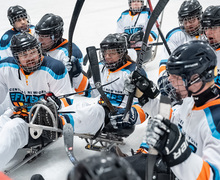Students in the United States need to pay more attention to global news
Micaela Warren | Photo Editor
While studying in London, our columnist was exposed to how the American education system never focuses on foreign affairs.
To support student journalism and the content you love, become a member of The Daily Orange today.
In 2019, the Council on Foreign Affairs and the National Geographic Society conducted a survey that sought to find out how much Americans knew about foreign affairs. The study concluded that Americans generally lack global awareness, despite most respondents claiming they consider international issues important. In the survey, only six percent of respondents answered more than 80 percent of the questions regarding international issues correctly.
The American education system prioritizes American exceptionalism, which hinders students from being able to think critically and extensively about the world around them. I personally have never had a lesson about geography, much less the inner workings of international issues.
Additionally, students are less likely to learn about another country if it isn’t directly related to domestic affairs. I’m guilty of this even when consuming news, as I gather my information from American based companies and generally only learn about another country’s news when a major event takes place. It’s easy to place yourself into an America-centric bubble by only consuming and learning topics about America, written by Americans.
Since studying abroad in London, I have noticed that a lot of the locals I met have a much better understanding of foreign affairs than my peers and me. This might be due to Britain’s proximity to Europe and loose visa regulations, allowing citizens to visit and learn from neighboring countries. It also might be as a result of the diverse European education system, which does not exclusively teach about domestic affairs but compares internationally as well.
European students grow up studying multiple languages with diverse teachers. In my classes at Syracuse, many of my professors were experts on domestic policies, while my professors in London are well versed in the political systems of Middle Eastern and European countries, in addition to American politics.
Even strangers I met while traveling in Europe were able to engage in conversations about global politics. When I face confusion about international politics I can rely on my family here, who are British, to provide context and answers to any question I have, regardless of topic. Every European seems to have a general baseline knowledge in regard to foreign understanding, which is lacking in the states.
Studying abroad has helped my own global awareness as professors have challenged me to think multiculturally or to research crises occurring in other countries. Despite my own increase of knowledge, not everyone gets the opportunity to study abroad and see for themselves the possibilities of foreign understanding. Regardless, I think it is important for American students to have a broader understanding of global issues and affairs. In an increasingly globalized society, an understanding of the world around us will only help to improve it.
There are a lot of ways to achieve global awareness even if you haven’t had studies that touch on foreign affairs. I think the easiest way to start is updating where you get your news from. Even branching away from the New York Times and reading the BBC or Al Jazeera — outlets that tackle diverse topics — might expand your knowledge. Other avenues for information include podcasts, such as the CFR’s Daily News Brief, which summarizes events around the globe, or simply taking a class revolving around international issues and affairs.
By immersing yourself in one form of media to improve your global awareness, you will have the opportunity to learn about politics, societies, cultures and news you may have never heard about otherwise.
Hannah Starorypinski is a junior political science major with a minor in public communication. Her column appears bi-weekly, and she can be reached at hkstaror@syr.edu.

Published on November 28, 2022 at 11:34 pm





